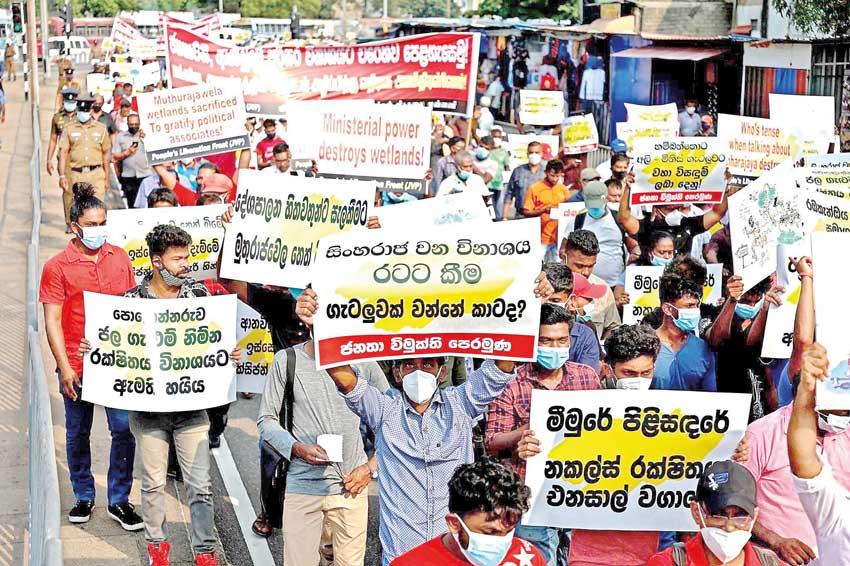Reply To:
Name - Reply Comment

Many social groups have showed the strength to voice concerns when environmental destruction takes place unchecked
Bhagya came into the limelight because she spoke against what she thought was wrong using her intellect which tells her that deforestation of forests leads humans on to a road to destruction
If this regime was far thinking it would not have made a hue and cry about Bhagya’s issue at the time the United Nations Human Rights Council sessions were on
The present government has shown a lukewarm interest in solving the national question and speeding up the reconciliation process
 Sri Lanka is slowly moving into an uncertain future. The reason for this would be that the lawmakers of this country are adamant at promoting their personal views ahead of reality. The present environmental issues that have cropped up underscore that those in power give scant respect to dissent and would silence critics who speak against the regime.
Sri Lanka is slowly moving into an uncertain future. The reason for this would be that the lawmakers of this country are adamant at promoting their personal views ahead of reality. The present environmental issues that have cropped up underscore that those in power give scant respect to dissent and would silence critics who speak against the regime.
How the Police went to record statements from Bhagya Abeyratne because she voiced concerns against deforestation in lands close to Sinharaja proves that this regime hates being questioned.
Right now Bhagya needs no introduction. She came into the limelight because she spoke against what she thought was wrong using her intellect which tells her that deforestation of forests leads humans on to a road to destruction.
Now we have arrived at a situation where even teenagers like Bhagya know that this regime is not environment friendly and doesn’t have the capacity to distinguish right from wrong.
If this regime was far thinking it would not have made a hue and cry about Bhagya’s issue at the time the United Nations Human Rights Council sessions were on. This is the difference between those in power doing administration instead of politics. These incidents go on to show in no uncertain terms how a country would suffer consequences when seasoned politicians are eliminated from decision making. Right now the regime believes that people with a military background know everything and have solutions for every problem in the country.
This regime choses the hardest ways to solve the county’s problems. We saw how things unfolded at the UNHRC sessions. The Government of Sri Lanka (GoSL) lobbied aggressively for votes to defeat the resolution moved against Sri Lanka. The result was a crushing defeat; 22 countries voted for the resolution and 11 nations voted against. Sri Lanka’s ‘friendly’ neighbour India abstained from voting. India’s decision, if analysed carefully, was clear as saying‘yes’ to the resolution because anything done instead of voting against the resolution amounts to supporting a probe into human rights violations in Sri Lanka.
This Government was formed by the votes of 690,0000 people. There were very few Tamil votes among them. The present government has shown a lukewarm interest in solving the national question and speeding up the reconciliation process.
India saw the need to get involved in Sri Lanka’s matters because of Tamil Nadu. Just before the UNHRC sessions in Geneva AIADMK aired its voice and called the Central Government of India to vote against Sri Lanka and support a resolution that was moved by powerful nations led by the UK
In this context one sees the Government of India stepping up its initiative to build houses for the less affluent Tamils in the estate sector and in the war-torn areas of the north. India saw the need to get involved in Sri Lanka’s matters because of Tamil Nadu. Just before the UNHRC sessions in Geneva All India Anna Dravida Munnetra Kazhagam (AIADMK) aired its voice and called the Central Government of India to vote against Sri Lanka and support a resolution that was moved by powerful nations led by the UK. The underlying lesson here is that when the government of a country fails to genuinely entertain the problems of the minority groups other nations with vested interests intervene.
At present environmentalists have ganged up against the regime due to the deforestation activities that are happening in certain parts of the country. The good thing about the issue which has been a cause for concern for environmentalists is that they have the support of powerful social activity groups, eminent personalities and some sections of the Buddhist clergy.
Like with the national question if the environmental issues go out of hand it won’t be long before these forces fighting for democracy and to save the nature start receiving oversees funding. First the government must acknowledge ‘if’ these deforestation claims are true to the magnitude that they are highlighted and work together with environmentalists to stop whatever deforestation that’s taking place. The government must also move away from the thinking that ‘it knows it all’ and the military and ex-military personnel are qualified to undertake any task in the civil society.
Right now the Muslim community is agitating against the regime because some of their practices and the Sharia Law would be taken out of the system. The system referred to is the manner in which civil disputes are settled in accordance with the scriptures of the Islam faith. Even in other communities disputes are amicably settled following a certain thinking or civil practice to avoid the matter lead up to a court case.
We read enough of stories about Madrasa Schools being banned and steps being taken to prohibit ladies from wearing the burqa. The Madrasa Schools, as reported in newspapers, had received extensive funding from overseas. Both the schools and the burqa have been looked upon as issues that need to be ‘checked’ purely for security reasons. Whether the government’s stance taken regarding these two issues is justifiable is hugely justifiable.
We have seen many Muslims and Tamils having their education in national schools along with their Sinhalese brothers and sisters. Even after leaving school these Muslim and Tamil students show a belonging to these academic institutions, but sadly many of them don’t show that feeling towards their motherland; ‘thanks’ to nationalist Sinhalese politicians who wish to treat non-Sinhalese as second class citizens of Sri Lanka. One good thing about this government is that citizens have some faith in the country’s security system. But the government must keep in mind, and give constant reminders to the security establishment, that there is a difference between fighting a war and supervising an anti-terrorism programme. We as a nation must rid ourselves of this mentality for war; or another fresh war. Critics point out that one can’t succeed in supervising an anti-terrorism programme with the mentality or approach of going to war.
All these countries who backed moving a resolution against Sri Lanka are aware of the disgruntled minorities and their issues in the island. The latest is the new turn to the daily wage issue of the tea estate workers. The government ensured the Rs 1000 daily wage, but companies that own estates have gone to court with a petition seeking the ‘issuing of a writ order nullifying the gazette notification which stipulates the new daily wage for estate labourers. A problem develops into something phenomenal when a regime fails to sort out a homegrown problem with a homegrown solution.
Individuals like Bhagya Abeyratne, environmentalist Sajeewa Chamikara and especially pet lover, environmentalist and entrepreneur Otara Gunawardene have voiced their concerns about the problems encountering the environment. This regime must understand that, one day, we as Buddhists have to leave this earth when our time is up; hence our duty to leave planet earth in a better place than how we found it. Thinking in the lines of learning a lesson of ‘letting go’ we must study Otara’s life and the empire she built by the name of Odel. Sri Lanka like Odel will function smoothly if the baton of control is handed over wisely, by those in power, at the right time to the next in line, but on one condition and that’s that they love the environment!